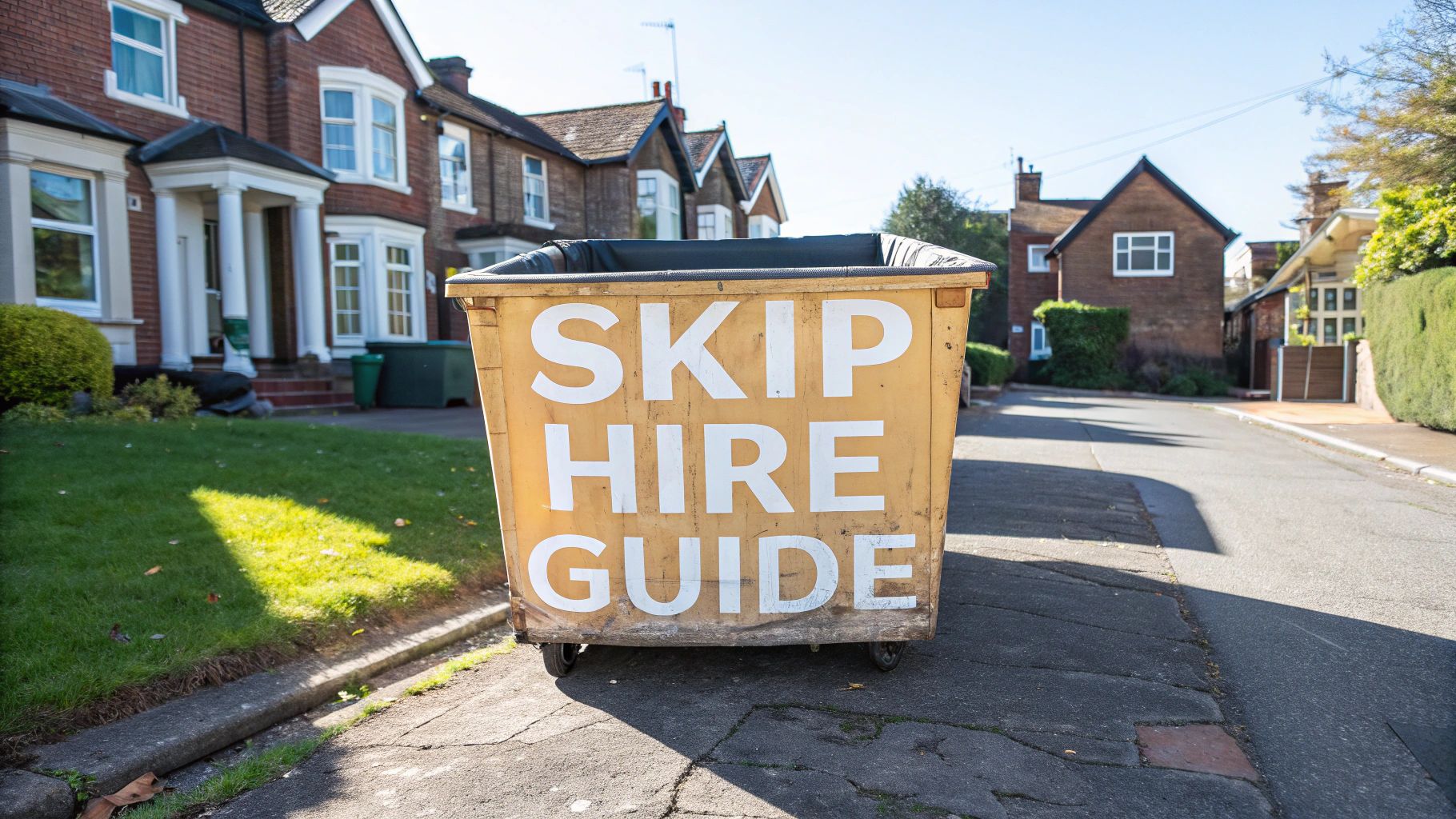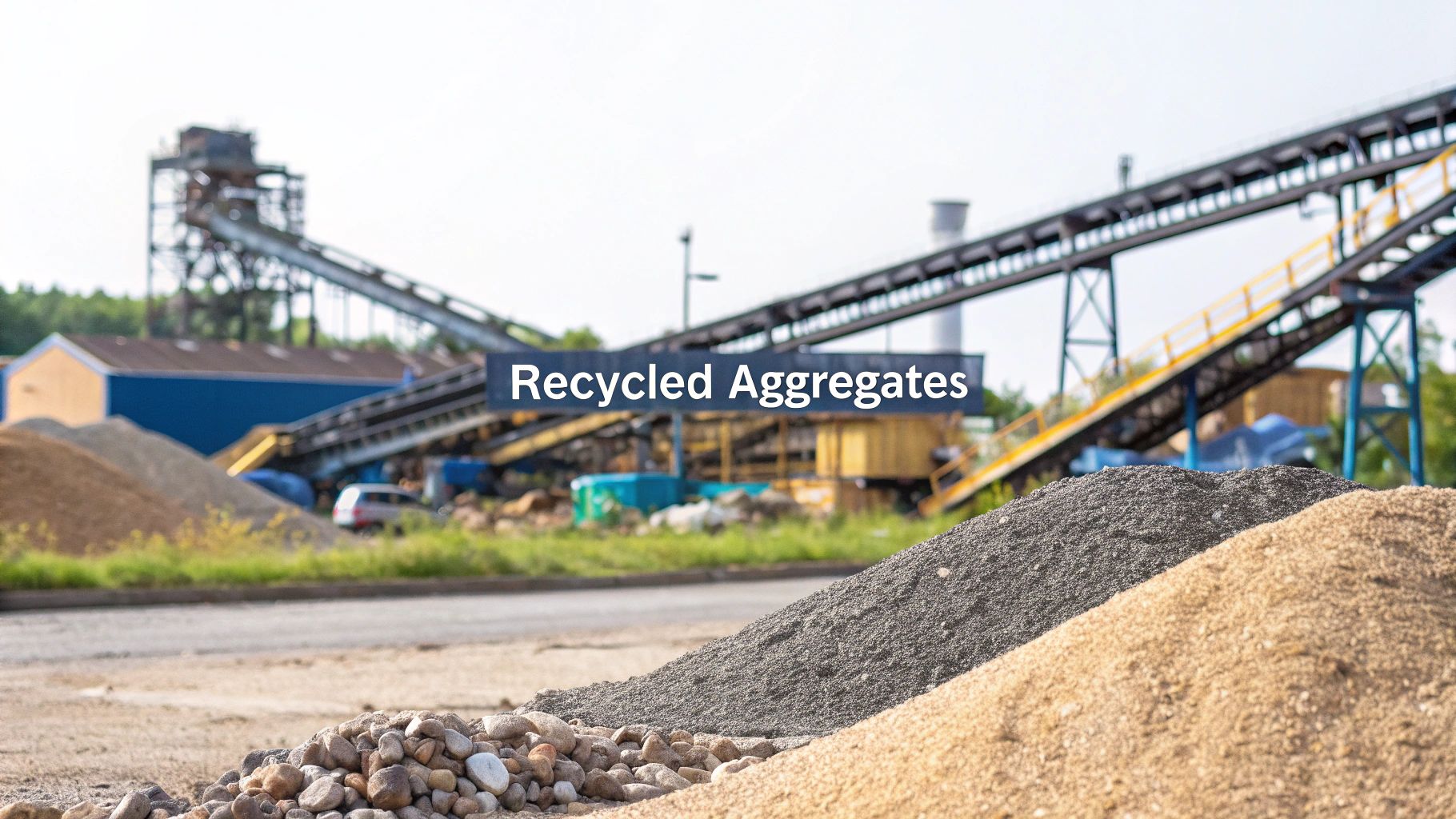A Guide to Skip Hire in Bournemouth
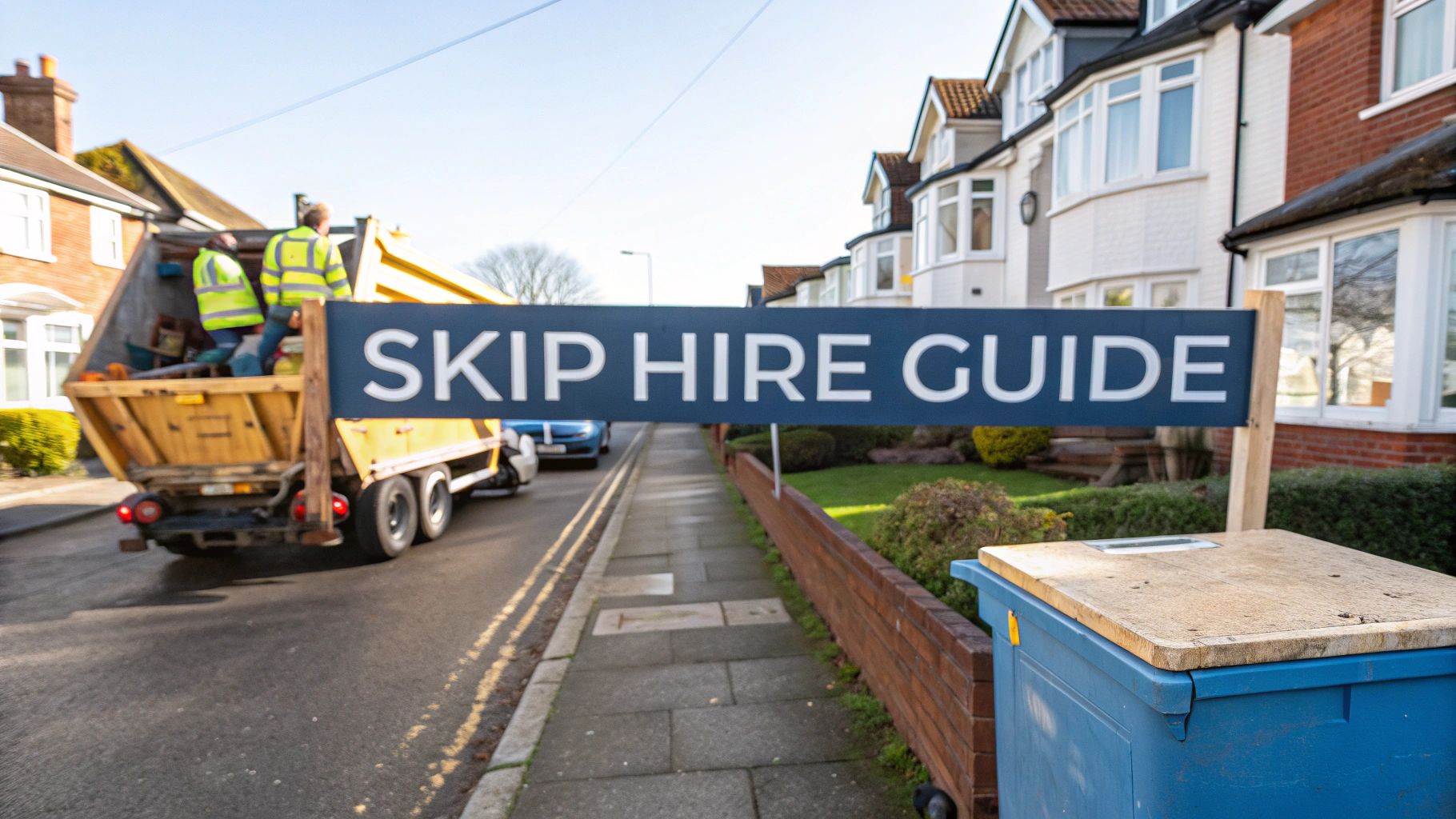
A Guide to Skip Hire in Bournemouth
Arranging a skip hire in Bournemouth is easily the most efficient way to handle the rubbish from a home renovation, garden clear-up, or even a commercial job. It just takes the hassle out of the whole disposal process, letting you know everything is being handled legally and responsibly by professionals.
Your Essential Guide to Hiring a Skip in Bournemouth
Got a project planned in Bournemouth and already dreading the mountain of waste? Think of this guide as your straightforward roadmap to hiring a skip without the usual headaches. It’s funny how waste management is a massive part of any successful project, but it often gets pushed to the back of the to-do list, leading to stress and surprise costs down the line.
Especially in a place like Bournemouth, where everyone’s conscious of keeping the area clean, getting your head around the options is the first step.
The Bournemouth, Christchurch and Poole (BCP) Council area deals with a huge amount of rubbish—over 188,546 tonnes were collected in the last recorded year alone. Your regular bin collections are great for day-to-day stuff, but they just aren’t cut out for the sheer volume of debris from a new kitchen, a big garden landscaping job, or an office clear-out. That’s where a good skip hire service really comes into its own.
Making the Right Decisions Early
Before you even pick up the phone to book, a few key decisions will completely shape your experience. Getting these right from the start will save you a world of pain (and money).
- What’s the job? Is this a small weekend garden tidy-up or are you ripping out a whole bathroom? The scale of your project is the biggest clue to what size skip you’ll need.
- What are you throwing out? Is it general household clutter, heavy stuff like soil and bricks, or just green waste? Different materials have different rules.
- Where will the skip go? Do you have a private driveway with space, or will it have to sit on the road? This is a big one, as it dictates whether you’ll need a permit from the BCP council.
A classic rookie mistake is underestimating how much stuff you actually have. It’s almost always cheaper to get a slightly bigger skip from the outset than to have to order a second one later on.
Nailing these fundamentals sets you up for a smooth ride. For instance, if you know the skip has to go on a public road, you’ll need to make sure your chosen company can sort out the council permit for you—it’s a legal must-have to avoid hefty fines. Likewise, knowing that things like plasterboard and old TVs can’t just be chucked into a general skip helps you separate your waste as you go.
This guide will walk you through every stage, from picking the perfect skip for your job to making sure your waste is handled in an environmentally friendly way. Get these first steps right, and your skip hire in Bournemouth will feel like a seamless part of your project, not another problem to solve.
Before we dive into the details, here’s a quick summary of the key things to keep in mind.
Skip Hire At a Glance: Key Considerations
This table breaks down the most important factors to think about before you commit. A quick look here can save you a lot of hassle later.
| Consideration | Why It Matters for Your Bournemouth Project | Top Tip |
|---|---|---|
| Skip Size | Getting it wrong means either paying for unused space or needing a second skip. | Always round up. If you’re torn between two sizes, go for the larger one. It’s more cost-effective. |
| Waste Type | Certain items (like plasterboard, fridges, tyres) can’t go in a general skip. | Make a quick list of what you’re throwing out before you call to book. This helps the company advise you correctly. |
| Placement & Permits | A skip on a public road in the BCP area requires a council permit. No permit = potential fines. | If you need a permit, check that your skip hire company arranges this for you. Not all do. |
| Access | The delivery lorry needs clear access to drop off and pick up the skip safely. | Check for overhanging trees, narrow gates, or tight corners that could cause a problem for a large vehicle. |
| Hire Duration | Standard hire is often 1-2 weeks, but extensions can be costly if not planned. | Be realistic about your project timeline. It’s better to book for a few extra days than to rush. |
Having these points sorted in your head will make the entire process, from getting a quote to waving the skip goodbye, that much simpler.
Choosing the Perfect Skip Size for Your Project
One of the most common—and frustrating—mistakes when arranging a skip hire in Bournemouth is getting the size wrong. It’s a classic Goldilocks problem. Order a skip that’s too small, and you’re stuck with a pile of rubbish and the unexpected cost of hiring a second one. Go too big, and you’ve essentially paid to transport fresh air.
Moving beyond abstract measurements like cubic yards is key. It’s far more useful to think in practical terms you can actually visualise. For instance, how many wheelbarrow loads will it hold? Or how many standard black bin bags? This approach helps you match your project’s waste output to the perfect skip, ensuring you get it right the first time.
Decoding the Most Common Skip Sizes
Let’s break down the typical sizes you’ll find from Bournemouth suppliers and connect them to real-world jobs. This should help you estimate your waste volume with a bit more confidence.
- 2-Yard ‘Mini’ Skip: This is your smallest option, absolutely ideal for minor clear-outs. Think of it as the perfect partner for a weekend garden tidy-up or decluttering a single room. It typically holds around 20-30 black bin bags.
- 4-Yard ‘Midi’ Skip: A decent step up, the 4-yarder is a very popular choice for small kitchen or bathroom refits. It can handle a mix of light and heavy waste, holding roughly 30-40 bin bags worth of rubbish.
- 6-Yard ‘Small Builder’s’ Skip: Now we’re talking. This is one of the most versatile and commonly hired skips for domestic projects. It’s just right for larger garden clearances, clearing out a garage, or getting rid of soil and rubble from a small extension. You can expect it to hold about 50-60 bin bags.
- 8-Yard ‘Large Builder’s’ Skip: This is the biggest skip you can usually get for heavy waste like soil and hardcore. It’s the go-to for major home renovations, full house clearances, and smaller construction jobs, with a capacity of approximately 70-80 bin bags.
This image gives you a better feel for how these sizes stack up against everyday projects.
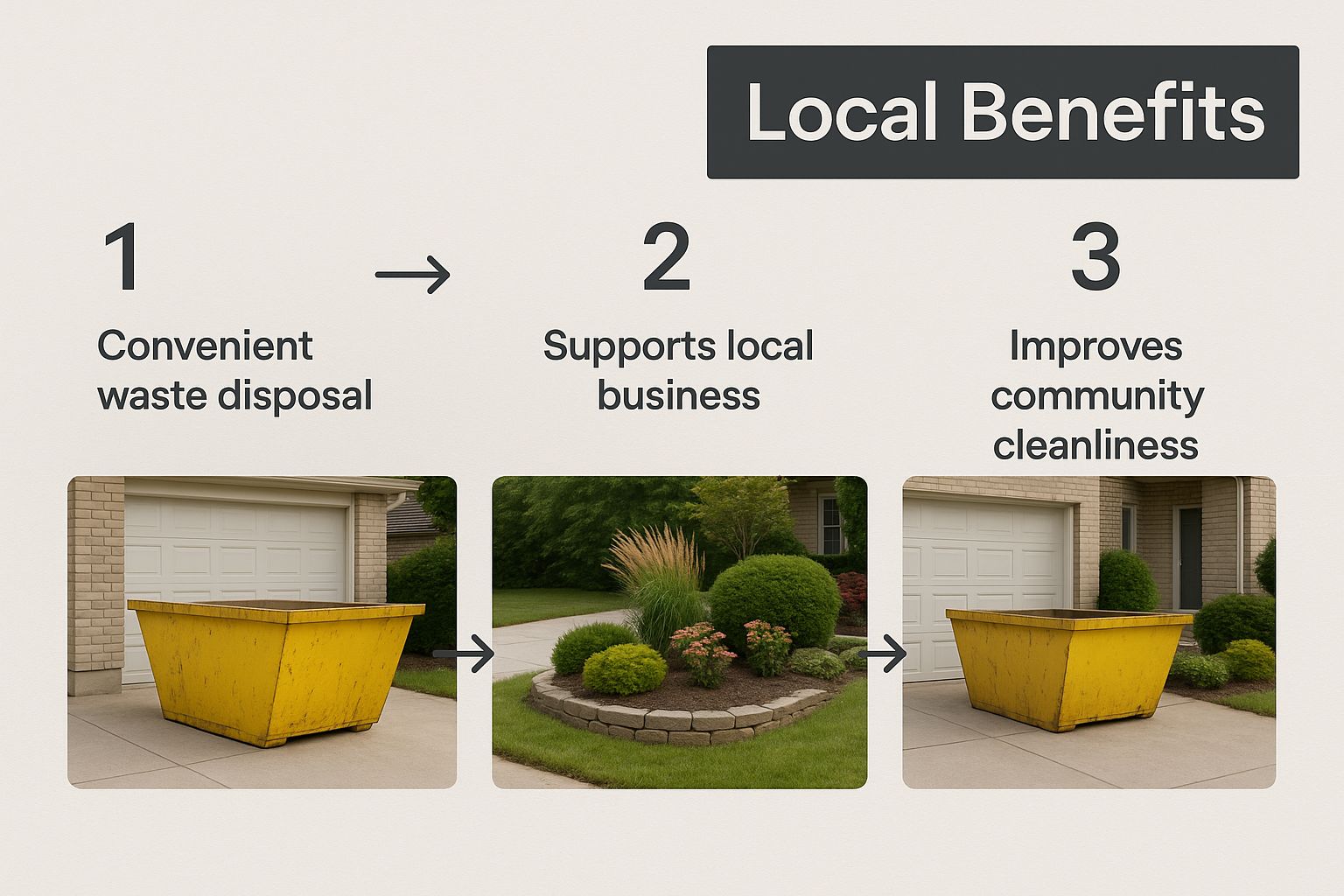
Visualising your project’s waste against these common skip sizes helps translate your needs into the right choice, preventing unnecessary costs down the line.
Estimating Your Waste: A Practical Approach
Before you pick up the phone, take a moment to walk around your project area. Try to mentally group the waste into piles. Imagine how many car boot loads it would take, or how many wheelbarrows you’d need to shift it all.
A good rule of thumb is that one cubic yard is roughly equivalent to 10 standard black bin bags or about 10-12 wheelbarrow loads of soil. For a more detailed breakdown, our guide on how skip sizes are explained offers in-depth comparisons.
Pro Tip: If you’re stuck between two sizes, it’s almost always more cost-effective to choose the larger option. The price difference is usually minimal compared to the significant cost of ordering a second skip later.
Skips for Bigger Commercial Jobs
While most home projects are well-served by skips up to 8 yards, larger commercial or construction sites in Bournemouth often need much more capacity.
For these bigger jobs, you’ll be looking at:
- 12-Yard ‘Maxi’ Skip: These are great for bulky but lightweight materials, such as wood, metal, and packaging from a large renovation. They are not suitable for heavy waste like soil or rubble due to weight restrictions.
- Roll-On Roll-Off (RORO) Containers: For the biggest jobs, RORO skips are the only solution. These can range from 20 to 40 cubic yards and are designed for high-volume waste from construction sites or industrial operations.
Choosing correctly is all about being realistic. Overestimating can waste money, but underestimating often costs even more in both money and project delays. By thinking about your waste in tangible terms—bin bags and wheelbarrows—you put yourself in the best position to select the most efficient and economical skip for your needs.
Navigating Skip Permits with BCP Council
Not everyone has a sprawling driveway perfect for a skip. If you’re tackling a project and the only spot for your skip is on a public road, pavement, or verge, you’ll need to sort out a skip permit. This isn’t just a friendly suggestion; it’s a legal must-have from the Bournemouth, Christchurch and Poole (BCP) Council.
Dropping a huge metal box on public land without the proper permissions is a big no-no. It’s a serious safety risk and can land you with some eye-watering fines. The whole point of the permit system is to make sure skips are placed safely, are visible to drivers and pedestrians, and don’t block access for anyone. It’s a small but vital step to keep your project above board and your neighbours happy.
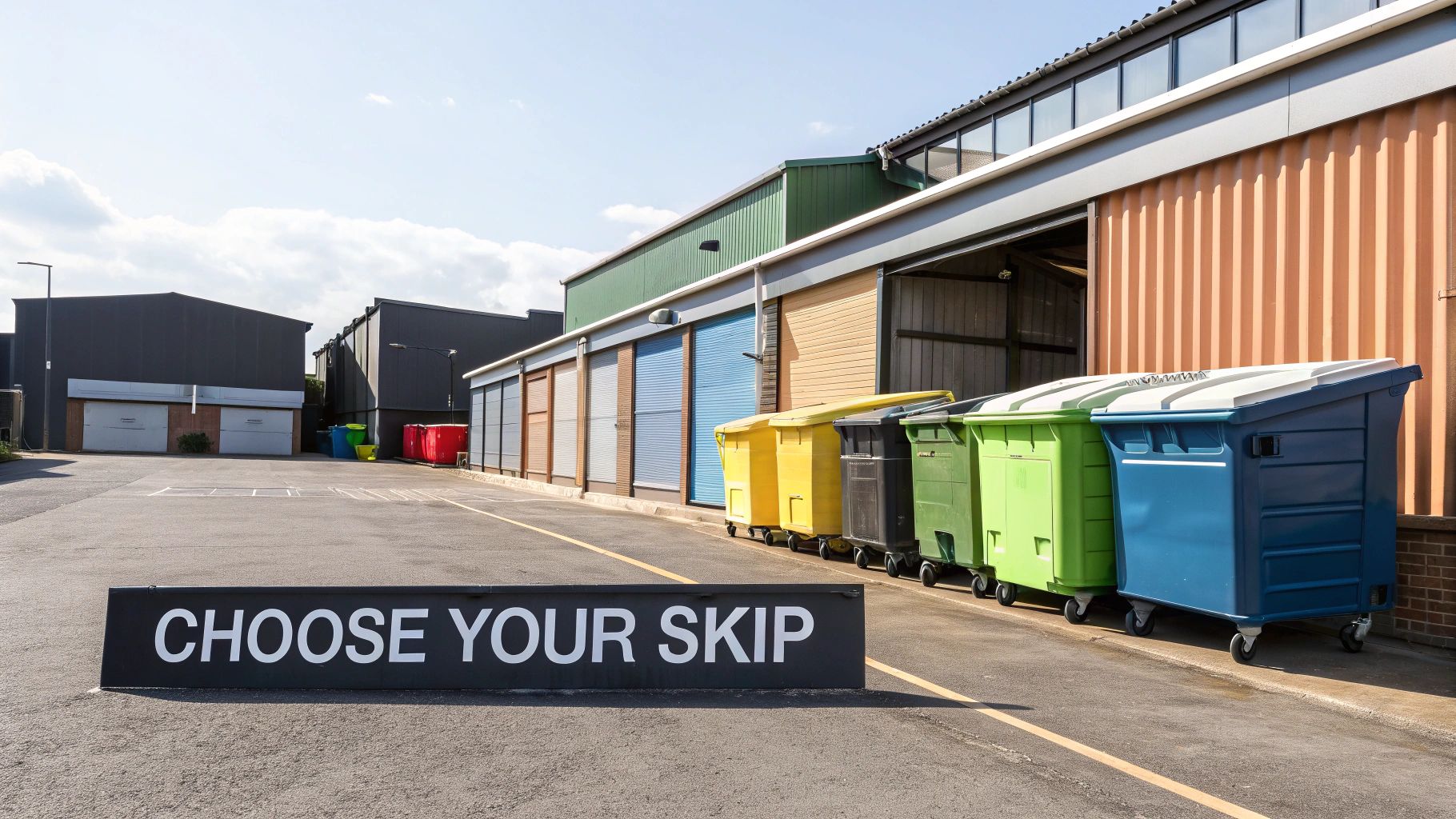
Who Arranges the Permit?
One of the first questions we always get asked is, “Do I have to phone the council myself?” Thankfully, in almost every case, the answer is no. Your skip hire company will handle the application and secure the permit for you.
Any reputable company offering skip hire in Bournemouth will have this process down to a fine art. They know exactly what BCP Council needs, how long it takes, and what paperwork is involved. When you make your booking, just let them know the skip is going on public land, and they’ll take care of the rest.
This is exactly why it pays to use a professional, registered waste carrier. They’re insured, they know the rules inside out, and it gives you one less thing to worry about.
Key Permit Details You Need To Know
Getting your head around the permit process helps you plan your timeline and budget properly. Even though your skip company does the legwork, there are a few key things you need to be aware of.
- Notice Period: You can’t just order a skip for next-day delivery on a public road. BCP Council needs time to process the application, so you should give your hire company at least 5-7 working days’ notice.
- Permit Costs: The council sets the fee for the permit, and this cost is passed on to you via your skip hire company. Prices can change, so it’s always a good idea to confirm the current fee when getting a quote.
- Duration: Permits are issued for a set amount of time, usually for one or two weeks. If your clear-out takes longer than planned, the permit needs to be renewed, which will mean an extra cost.
Factoring in the permit processing time is absolutely crucial. A last-minute decision to put a skip on the road can stall your entire project while you wait for the council to approve the paperwork.
Following Council Regulations
Once your permit is approved, there are strict safety conditions that have to be met. Your skip hire company will deliver a skip that ticks all the boxes, but it’s helpful for you to know what they are.
The skip itself must be:
- Clearly marked with the owner’s name and phone number.
- Fitted with reflective markings so it can be seen at night.
- Equipped with safety lamps that are lit when it’s dark.
- Sometimes surrounded by traffic cones to help guide cars and people safely around it.
If these rules aren’t followed, the permit can be cancelled and fines can be issued. Your hire company manages all of this, ensuring the skip they provide is fully compliant from the get-go.
If you want to dig a bit deeper, you can learn more about when you might need a skip permit in our detailed guide. It’s well worth a read to make sure you’re fully informed before you book.
The Real Cost of Hiring a Skip in Bournemouth
When you first look into hiring a skip in Bournemouth, you’ll probably notice the prices can swing quite a bit from one company to the next. It’s a common mistake to think you’re just paying to rent a big metal box. The truth is, the final price on your invoice is a blend of several costs, some of which aren’t immediately obvious.
Getting your head around what you’re actually paying for is the best way to spot a fair deal and sidestep any nasty surprises. The price isn’t just a number pulled from thin air; it covers the entire lifecycle of your waste, from the skip lorry leaving the depot to the final, responsible disposal of everything you’ve thrown in.
Breaking Down the Core Costs
Think of your skip hire quote as a package deal. It’s built on a few key services that all contribute to the final figure.
- Delivery and Collection: This is the most straightforward bit. It pays for the fuel, the lorry’s upkeep, and the driver’s time for two trips to your property – one to drop the skip off and another to pick it up.
- Waste Sorting and Labour: Once your skip is collected, it doesn’t just get dumped in a landfill. It’s taken to a licensed waste transfer station where a team gets to work, sorting the contents by hand and with machinery to separate what can be recycled from what can’t.
- Recycling and Disposal Fees: After sorting, every type of material has its own path. Recyclables are sent off for processing, while the non-recyclable waste goes for disposal. Landfill is the most expensive route by far, thanks to hefty government taxes designed to discourage it.
The skip itself is just the container. What you’re really paying for is the professional service of sorting, processing, and legally disposing of your waste.
Why Are Prices Going Up?
Beyond the day-to-day running costs, wider economic pressures have a huge say in what you pay. In the last few years, these external factors have been one of the biggest reasons for price hikes across the industry.
We’ve all felt the pinch from supply chain disruptions and rising operational costs. For skip companies, transportation costs have shot up. In fact, transport now accounts for 34% of total operational costs, a massive jump from just 18% in 2019. This is especially true down here. You’ll often find that rates in London and the South East, including Bournemouth, are 23-35% higher than up North. That’s down to things like city congestion, higher fuel prices, and more expensive disposal fees. You can get a deeper insight into these post-Brexit price pressures and their impact from industry reports.
The Hidden Costs to Watch Out For
While a good quote covers the essentials, some situations can lead to extra charges. Knowing about these potential add-ons can save you from an unexpected bill.
Keep an eye out for these common extras:
- Permit Fees: If the skip has to live on a public road, you’ll need a permit from the BCP council. This fee is passed directly on to you.
- Extended Hire Periods: A standard hire usually lasts for 7-14 days. Need it longer? Most companies will add a daily or weekly charge.
- Restricted Items: Chucking things like plasterboard, tyres, or old fridges into a general waste skip is a big no-no. They need special, more expensive disposal, so you’ll face a contamination charge if you mix them in.
- Overloading: You can’t fill a skip past the marked level line. It’s dangerous and illegal for the driver to transport it. You’ll be asked to unload the excess, which could lead to delays or even a “wasted journey” fee if the driver has to come back.
Understanding all these moving parts helps you see why the cheapest price isn’t always the best value. A transparent quote reflects a company’s commitment to managing your waste legally and responsibly—which protects both you and our beautiful local environment.
What You Can and Cannot Put in Your Skip
Filling your skip isn’t just a game of rubbish Tetris. What you put in there matters—a lot. Getting it right is about safety, following the law, and doing your bit for the environment. Before you start your skip hire in Bournemouth, knowing what’s allowed and what’s strictly off-limits will save you a world of hassle, including potential fines and delays.
Think of a standard skip as your go-to for general, non-hazardous waste. Most of the stuff you’ll generate from a typical home clear-out, garden tidy-up, or small building project gets the green light. The best part is you can mix most of these approved items together, making the job much simpler.
Generally Accepted Items
For the majority of projects, you can confidently chuck a wide range of common waste into your skip. These are the materials that waste companies are fully equipped to handle and recycle properly.
- Household Waste: Old furniture like sofas and wardrobes, worn-out carpets, kids’ toys, and general household clutter.
- Building Debris: Things like bricks, rubble, concrete, and stones are absolutely fine.
- Wood and Metal: All types of wood, from old fence panels to floorboards, can go in, along with any scrap metals.
- Garden Waste: Soil, grass clippings, leaves, and small branches are all welcome.
- Plastics and Cardboard: Packaging materials and other non-hazardous plastics can be included.
Loading these items correctly makes a huge difference at the waste transfer station, helping the team separate everything for recycling.
Strictly Prohibited Items You Must Avoid
Right, this is the crucial bit. Certain items are classed as hazardous or need specialist disposal, which means they must never be thrown into a general waste skip. If you mix them in, the skip company could refuse to collect the load, or worse, you could be hit with hefty contamination charges.
A common mistake is thinking, “It’s just one little thing, it won’t matter.” But a single banned item can contaminate the entire skip load, making it impossible to recycle and landing you with a serious penalty.
Here’s a quick list of the usual suspects that are not allowed:
- Asbestos: This is a seriously hazardous material. It’s illegal to put asbestos in a skip and it requires a specialist removal service.
- Plasterboard: Thanks to environmental regulations, plasterboard can’t be mixed with general waste. It has to be disposed of separately.
- Electricals (WEEE): Anything with a plug or batteries is a no-go. This includes TVs, computers, fridges, and microwaves, which all fall under WEEE (Waste Electrical and Electronic Equipment) rules.
- Batteries: Both car batteries and household batteries contain nasty chemicals and are a fire hazard.
- Tyres: These are notoriously difficult to get rid of and are banned from landfill sites.
- Chemicals: This covers paint, solvents, oils, and other liquid chemicals.
- Gas Cylinders: Pressurised containers like these pose a very real explosion risk.
For a full rundown of what you should keep out of your skip, our complete guide on what can and can’t go in a skip provides even more detail.
The Financial and Environmental Cost of Getting It Wrong
Ignoring these rules isn’t just bad form; it has real consequences. Waste management firms are under increasing pressure from changing environmental laws and soaring landfill taxes. As of April 2025, the standard landfill tax rate is set to climb to £126.15 per tonne.
On top of that, stricter rules under the Environmental Protection Act mean skip hire companies can be fined over £500 for a single contaminated load—a cost they have no choice but to pass on to the customer.
Ultimately, taking a few minutes to sort your waste properly does more than just save you from a fine. You’re playing a part in protecting Bournemouth’s local environment, making sure more of your waste is recycled, and keeping your project on track and on budget.
Pro Tips for a Hassle-Free Hire

So, your skip is on its way. Brilliant. But getting it delivered is only half the story. A few simple strategies at this stage can make the whole job smoother, safer, and a lot easier on your wallet. These are the little details we’ve picked up over the years that make all the difference, helping you use every last inch of space while keeping your property in top nick.
First off, let’s talk about your driveway. A full 8-yard skip can weigh several tonnes – more than enough to leave its mark on tarmac or block paving.
The fix is surprisingly simple. Before the skip arrives, just lay down some old wooden planks or scaffold boards where its corners will sit. This spreads the weight and acts as a buffer, preventing any unsightly cracks or dents. It’s a five-minute job that could save you a real headache and a costly repair bill down the line.
Maximising Your Skip Space
There’s a real art to loading a skip properly. If you just chuck everything in randomly, you’ll be amazed at how quickly it fills up with nothing but fresh air. A bit of organisation goes a long, long way.
- Break It Down: Got an old wardrobe or a chest of drawers? Take them apart before they go in. Flat-pack furniture takes up a fraction of the space.
- Load Strategically: Think like you’re playing Tetris. Start with flat items like doors, plasterboard, or panels to create a level base. Follow that with your heaviest stuff, like soil or rubble. Then you can fill in all the gaps with the smaller bits and pieces.
- Use the Corners: The corners are prime real estate that often gets ignored. Tuck smaller, awkward items into these spots to make sure you’re using every inch you’ve paid for.
Remember the golden rule of skip hire: load heavy to light. Stacking the weighty items at the bottom creates a solid, stable base. This stops the load from shifting about and lets you build everything up evenly and safely.
A methodical approach like this means no wasted space, ensuring you get maximum value from your skip hire in Bournemouth.
Plan Your Hire Period and Access
Timing is everything. Try to be realistic about how long your clear-out will take. It’s almost always cheaper to book the skip for an extra day or two from the start rather than trying to get a last-minute extension when you’re halfway through the job.
It’s also worth noting how the market is changing. We’re seeing a big increase in office refurbs, for example, which is driving up demand for certain skip sizes. This just goes to show how important it is to book the right skip for the right amount of time. You can read more about these evolving UK skip hire trends to see how it might affect availability in our area.
Lastly, do a quick check of your access. Make sure the lorry can get in and out easily on both delivery and collection day. Look out for low-hanging branches, tight corners, or neighbours’ cars that could get in the way. A failed delivery attempt often comes with a wasted journey fee, which is an extra cost you can easily avoid with a bit of forward planning.
A Few Common Questions Answered
If this is your first time hiring a skip, you’ve probably got a few questions. That’s completely normal. To help you out, here are some straight-talking answers to the questions we hear most often from our customers in Bournemouth.
How Long Can I Keep the Skip For?
Most of our customers find that the standard hire period of 7 to 14 days is plenty of time for their project, whether it’s a garden clear-out or a small renovation.
But we know things don’t always go to plan. If you think you’ll need it for longer, just let us know when you book. Arranging an extended hire from the start is usually much cheaper than trying to add extra days on later.
On the flip side, if you’re finished sooner than expected, just give us a call. We’ll happily arrange an earlier collection to get the skip off your property and out of your way.
My best advice? Always be realistic about how long your job will take. It’s far better to have the skip for an extra day you don’t end up needing than to be rushing against the clock or paying extra for a last-minute extension.
Do I Need to Be at Home for the Delivery?
It’s always best if you can be there, especially if you’ve never hired a skip before. Being on-site means you can have a quick chat with the driver, point out exactly where you want it, and make sure there are no surprise issues like low-hanging branches or a gate that’s a bit too snug.
If you absolutely can’t make it, that’s okay, but you’ll need to give us crystal-clear instructions. A great little tip is to mark out the exact spot where you want the skip to go. A couple of wooden planks or even some bright cones will do the job perfectly, leaving no room for confusion.
What Happens if I Overfill the Skip?
Whatever you do, don’t overfill the skip. It’s not just a company rule; it’s a legal and safety requirement. All the waste has to be contained inside the skip, staying below the ‘level load’ line that’s clearly marked on the side.
Our drivers are legally forbidden from taking an overloaded skip. If items are piled high, they could easily fall out during transport and cause a serious accident on the road.
If our collection team turns up and the skip is overfilled, they’ll have to ask you to remove the extra waste before they can load it onto the lorry. This can cause a real headache and delay your project, and you might even be charged a ‘wasted journey’ fee.
For a straightforward and reliable skip hire in bournemouth, look no further than The Waste Group. We handle everything from permits to responsible disposal, ensuring a hassle-free experience every time. Book your skip online today.
